 |
Resources > Mental Health Support
Anxiety and Autism
Managing anxiety in autistic adults
Source: Autism Speaks
Studies indicate that up to 50% of autistic adults experience an anxiety disorder, double the rate in neurotypical adults, often leading to misdiagnosis due to overlapping traits. Untreated anxiety can result in depression, aggression, and self-harm. Research suggests structural differences in the autistic amygdala imply a need for autism-specific anxiety management, though studies on effective treatments are limited. Autistic self-advocates share various strategies. While Cognitive Behavioral Therapy (CBT) isn't autism-adapted, some, like Lydia Wayman, find concepts like mindfulness helpful later in life. Interoception Therapy, a form of exposure therapy, helps individuals connect bodily sensations with emotions, improving self-regulation; Chloe, an autistic adult, found it effective for recognising anxiety cues. Applied Behavior Analysis (ABA), focused on person-centred goal selection and positive reinforcement, helped Chloe cope with change. Alternative Augmentative Communication (AAC), like iPad apps with pre-programmed phrases, assists verbal autistic people like Chloe in expressing themselves during overwhelming moments. Sensory Diets, using tools like weighted blankets or noise-cancelling headphones, help maintain a calm state, as shared by Brigid Rankowski and Chloe. Expressive art therapy and exercise (walking, swimming) are also noted for their calming effects. Finally, medication, such as SSRIs, can be prescribed, but their effectiveness varies, and alternative medicines like medical cannabis are being explored, though more research is needed for both. There is no one-size-fits-all solution, encouraging exploration of different options.
You can access this resource here:
Further reading, listening and viewing...
Have you seen our books about Autism and Neurodiversity?
Copyright ©2025 Peter J. Clark T/A Autism Info Center / Autism Speaks. All rights reserved worldwide. This information may not be copied, reproduced, excerpted, stored, indexed or distributed without the express written permission of the publisher, author, and copyright holder.
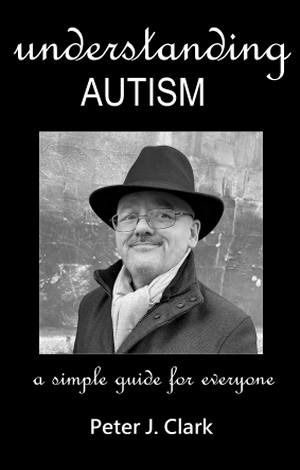 Written by an autistic author, this book explains what autism is, what it isn't, and how to support autistic people with kindness and consideration. It aims to help the friends, family and carers of autistic people, as well the general public, educators, healthcare providers, employers, authorities, and anyone else who might interact with autistic people. It clearly and concisely shows them what autism can 'look like', how to recognise it, how to sensitively offer support, and how to advocate for greater awareness, acceptance and inclusion in society.
Written by an autistic author, this book explains what autism is, what it isn't, and how to support autistic people with kindness and consideration. It aims to help the friends, family and carers of autistic people, as well the general public, educators, healthcare providers, employers, authorities, and anyone else who might interact with autistic people. It clearly and concisely shows them what autism can 'look like', how to recognise it, how to sensitively offer support, and how to advocate for greater awareness, acceptance and inclusion in society.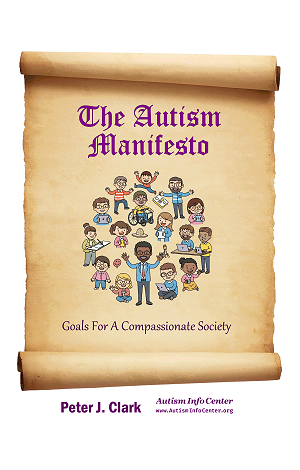 The Autism Manifesto provides a vital 'lived perspective' on autism and advocates for greater understanding, inclusion, and integration for autistic people in society. The manifesto challenges outdated views of autism as a deficit or something to be 'cured', instead presenting it as a natural human variation, and highlights the fact that different ways of thinking only serve to enrich society. Its core lies in the 10 Pillars of Inclusion, which offer direct, practical steps that everyone can take to improve the lives of autistic people in every walk of life, at home, at work, at school, in the community, in government, and in the authorities and legal systems.
The Autism Manifesto provides a vital 'lived perspective' on autism and advocates for greater understanding, inclusion, and integration for autistic people in society. The manifesto challenges outdated views of autism as a deficit or something to be 'cured', instead presenting it as a natural human variation, and highlights the fact that different ways of thinking only serve to enrich society. Its core lies in the 10 Pillars of Inclusion, which offer direct, practical steps that everyone can take to improve the lives of autistic people in every walk of life, at home, at work, at school, in the community, in government, and in the authorities and legal systems.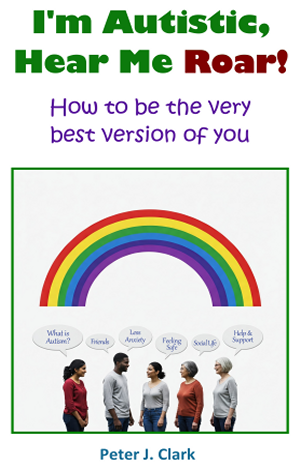 This is a book for autistic people, by an autistic writer. It helps you understand and embrace your autism and focus on all its positive sides (and all your strengths that come with it), as well as how to calm yourself in troubled times, and how to live a full life that's even happier, more fulfilling, and more meaningful, as part of your community. There are hundreds of practical ideas and advice for going out and enjoying life, meeting new people, making new friends, and maintaining existing relationships. It really is a guide to becoming the very best version of yourself!
This is a book for autistic people, by an autistic writer. It helps you understand and embrace your autism and focus on all its positive sides (and all your strengths that come with it), as well as how to calm yourself in troubled times, and how to live a full life that's even happier, more fulfilling, and more meaningful, as part of your community. There are hundreds of practical ideas and advice for going out and enjoying life, meeting new people, making new friends, and maintaining existing relationships. It really is a guide to becoming the very best version of yourself!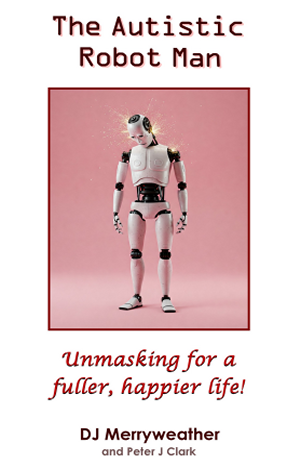 DJ Merryweather is autistic, and shares his life experiences of autism - always trying to fit in, masking his differences at every turn - and how it led to his ultimate burnout, after which he began dismantling his autistic masking habits, one by one. The book explains why you're masking, how bad it can make you feel, and why you probably feel like you're stuck with it - from social rules and situations to 'faking' emotions and learning to 'perform' feelings in socially expected ways. But most of all, it's an inspiring message about the value of unmasking your true self and living a happier, more fulfilling life.
DJ Merryweather is autistic, and shares his life experiences of autism - always trying to fit in, masking his differences at every turn - and how it led to his ultimate burnout, after which he began dismantling his autistic masking habits, one by one. The book explains why you're masking, how bad it can make you feel, and why you probably feel like you're stuck with it - from social rules and situations to 'faking' emotions and learning to 'perform' feelings in socially expected ways. But most of all, it's an inspiring message about the value of unmasking your true self and living a happier, more fulfilling life. This essential handbook is for those who care for and support vulnerable people and those with disabilities. If you want to move beyond 'task-focused' routines and deliver truly compassionate, person-centred care, this is the toolbox that will make all the difference to you and to those you look after. Written by an experienced social care professional, it provides practical strategies, reflective tools, and human insights that improve dignity, respect, and autonomy for those in your care. It emphasizes the need to honour the unique identity, humanity, preferences, needs and challenges of each person being supported. Learn to manage challenging behaviours with empathy, navigate the pressures of 'the system' and prevent yourself 'burning out' with dozens of self-care techniques. Use it to improve on the care and support you provide and make a genuinely compassionate, person-centred difference.
This essential handbook is for those who care for and support vulnerable people and those with disabilities. If you want to move beyond 'task-focused' routines and deliver truly compassionate, person-centred care, this is the toolbox that will make all the difference to you and to those you look after. Written by an experienced social care professional, it provides practical strategies, reflective tools, and human insights that improve dignity, respect, and autonomy for those in your care. It emphasizes the need to honour the unique identity, humanity, preferences, needs and challenges of each person being supported. Learn to manage challenging behaviours with empathy, navigate the pressures of 'the system' and prevent yourself 'burning out' with dozens of self-care techniques. Use it to improve on the care and support you provide and make a genuinely compassionate, person-centred difference.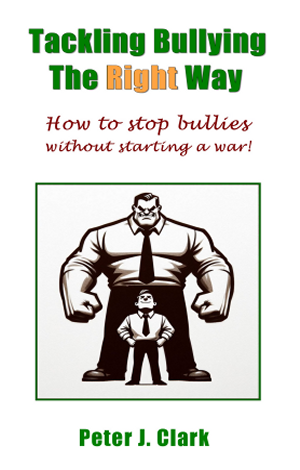 This is a comprehensive guide to addressing bullying whether it's at home, school, work, in clubs, in public, or online. It provides safe and ethical strategies to handle all the different bullying tactics from subtle manipulation to outright harassment and physical threats. It equips you to recognise bullying, deal with it safely but assertively, set proper boundaries, and document and report bullying wherever it finds you. Learn how to use support networks, safe ways of reporting bullying, and understand your legal rights to protect yourself and find the right way to deal with bullies without starting a war on your own doorstep!
This is a comprehensive guide to addressing bullying whether it's at home, school, work, in clubs, in public, or online. It provides safe and ethical strategies to handle all the different bullying tactics from subtle manipulation to outright harassment and physical threats. It equips you to recognise bullying, deal with it safely but assertively, set proper boundaries, and document and report bullying wherever it finds you. Learn how to use support networks, safe ways of reporting bullying, and understand your legal rights to protect yourself and find the right way to deal with bullies without starting a war on your own doorstep! This is Peter Clark. We're out there every day helping autistic people live happier, more fulfilling lives. We don't charge for what we do but, if you'd like to help us make lives better, we're very grateful for even the smallest of donations - but it's entirely your choice!
This is Peter Clark. We're out there every day helping autistic people live happier, more fulfilling lives. We don't charge for what we do but, if you'd like to help us make lives better, we're very grateful for even the smallest of donations - but it's entirely your choice!